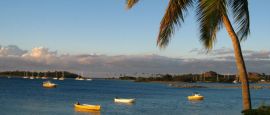Fiji History, Language and Culture
History of Fiji
Fiji has come a long way since the days of being referred to as the ‘Cannibal Isles’ by the European explorers who sailed their seas. Back then, mariners carefully avoided its shores because of its fierce warriors and treacherous waters.
The first inhabitants came from Melanesia, some 3,500 years ago, and established a hierarchical society based on clans. Little is known of the islanders’ history before the arrival of Europeans in the mid-17th century. The establishment of plantations destabilised the economy resulting in serious friction between the Fijians and Europeans.
In 1874, Fiji became a British colony. Large numbers of workers from India were imported to develop a plantation economy, accounting for the islands’ present ethnic mix. After gaining independence in 1970, the moderate conservative Alliance Party governed without interruption. However, Fiji’s political situation was to be anything but stable, with friction between ethnic Fijians and Indo-Fijians dominating politics over the last few decades and resulting in several military coups over the last 30 years. In 1987, a republic was declared following a coup and after another in 2006 Fiji’s then-president, President Ratu Josefa Iloilo suspended the constitution and appointed himself head of state in early 2009.
Later that year, Fiji’s failure to hold democratic elections saw the country become the first nation to be expelled from the Pacific Islands Forum; a few months later, Fiji was suspended from the Commonwealth of Nations because Prime Minister Frank Bainimarama refused to hold elections by 2010.
After years of delays a new Constitution was enacted and elections were finally held in September 2014 with Bainimarama’s FijiFirst party winning a resounding victory with 59.2 per cent of the vote as Fiji was re-admitted to the Commonwealth as well as the Pacific Islands Forum.
Perhaps not surprisingly Fiji has relatively large armed forces – almost 4,000 active soldiers and sailors with a further 6,000 reservists – and has contributed to several UN peacekeeping missions.
Did you know?
• Before 2012, the traditional Cibi war dance was performed by the Fijian national rugby team before each match. After it was decided the Cibi was a celebration of victory it was replaced by the new Bole war cry – an acceptance of a challenge.
• Fiji has an estimated 333 islands, 110 of which are permanently inhabited. Fiji also has over 500 islets.
• The Meke dance is an indigenous art form and usually incorporates men’s and the women’s dances to mark an important event. Some Mekes are generations old.




 You know where
You know where